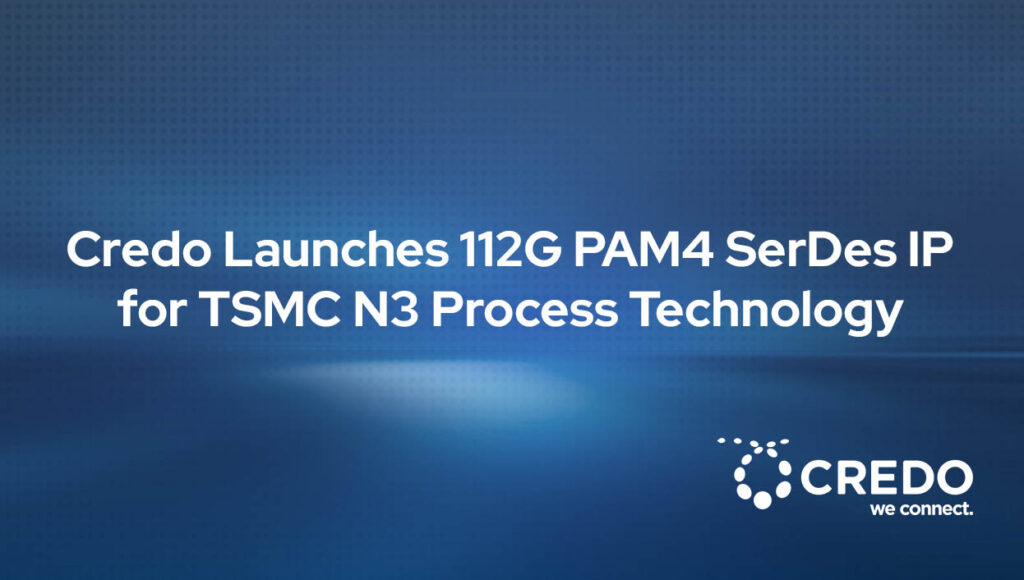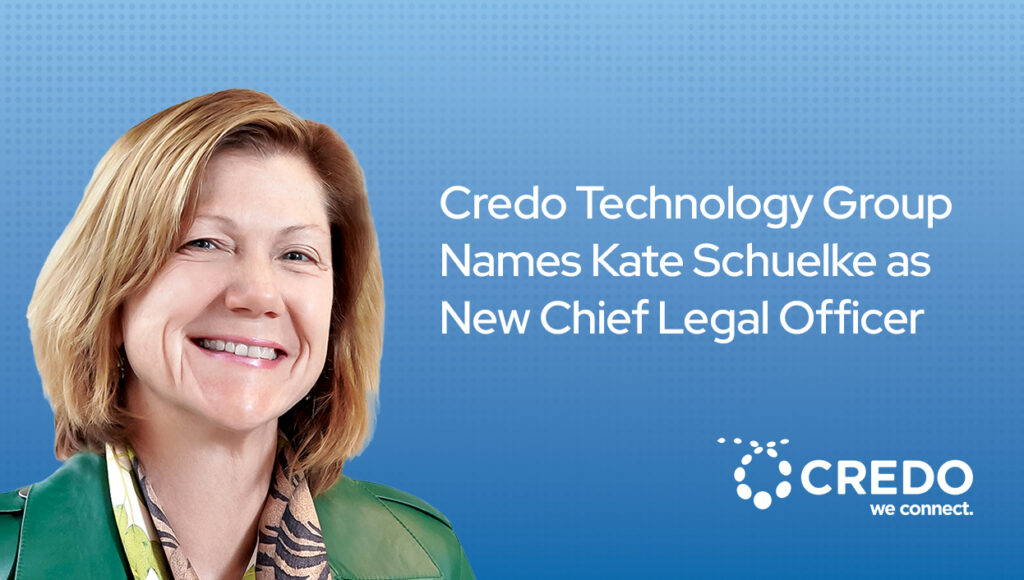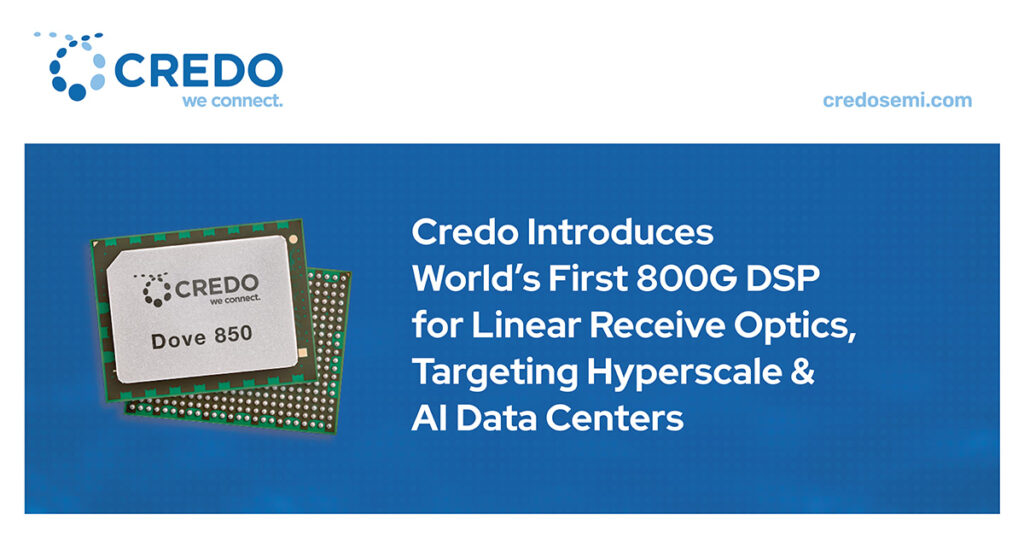Credo expands its unique programmable power versus channel reach performance SerDes technology to TSMC N3 and N7/N6 processes
SAN JOSE, Calif.—Feb 01, 2024—Credo Technology Group Holding Ltd (NASDAQ: CRDO) today introduced its newest 112G PAM4 SerDes Intellectual Property (IP) family on TSMC’s industry leading N3 and N7/N6 process technologies. These two new SerDes IPs complement Credo’s available IP in TSMC’s N5 process technology, which also includes the enhanced N4 version of the 5nm node. This comprehensive SerDes IP family supports a wide range of demands including long reach plus (LR+), long reach (LR), medium reach (MR) and very short reach plus (VSR), for applications including AI, machine learning, high performance compute, switching, security, and optical deployments.
Jeff Twombly, Vice President of Business Development commented, “Credo is committed to delivering industry leading performance combined with outstanding energy efficiency across the newest optimal process technologies and for a wide variety of reaches. By selecting from our broad portfolio of 112G PAM4 IP, our customers can design complex, monolithic chips rapidly and cost effectively for demanding applications.”

“We believe 112G SerDes is the critical technology to enable AI/ML at scale and will be the main driver for Ethernet Switch revenue and port growth over the next three years,” said Alan Weckel, Founder and Technology Analyst at 650 Group. “We anticipate that Credo’s purpose built, energy efficient, optimized low power programmable per reach 112G SerDes architecture will be a key building block for semiconductor companies as they migrate their designs to 800G and 1.6T.”
Credo’s advanced DSP based 112G PAM4 SerDes architectures were developed and proven on TSMC’s 12nm process technology. The 12nm technology was then integrated into Credo’s complete family of 112G per lane connectivity products for both copper and optical applications at 800G and 1.6T port rates. Credo then ported the 12nm, 112G SerDes to more advanced process technology nodes (N7/N6, N5/N4, and N3) – allowing customers to integrate the silicon proven technology into monolithic ASICs and chiplets.
Software programmable innovations allows customers to optimize power and performance on a lane-by-lane basis, unleashing new levels of system level performance. These new 112G PAM4 SerDes IP were designed to meet the growing data needs of high-speed, data-intensive applications. Credo's SerDes technology enables silicon solution providers and OEMs to manufacture custom chip solutions which address new market opportunities, while delivering on critical performance and low-power system level requirements. All Credo IP solutions are supported with evaluation boards, simulation models, characterization reports, reliability reports, design libraries and a complete set of supporting documentation. Customers interested in this new IP should contact sales@credosemi.com.
About Credo
Our mission is to deliver high-speed solutions to break bandwidth barriers on every wired connection in the data infrastructure market. Credo is an innovator in providing secure, high-speed connectivity solutions that deliver improved power efficiency as data rates and corresponding bandwidth requirements increase exponentially throughout the data infrastructure market. Our innovations ease system bandwidth bottlenecks while simultaneously improving on power, security, and reliability. Our connectivity solutions are optimized for optical and electrical Ethernet applications, including the emerging 100G (or Gigabits per second), 200G, 400G,800G and the emerging 1.6T (or Terabits per second) port markets. Credo products are based on our proprietary Serializer/Deserializer (SerDes) and Digital Signal Processor (DSP) technologies. Our product families include Integrated Circuits (ICs) for the optical and line card markets, Active Electrical Cables (AECs) and SerDes Chiplets. Our intellectual property (IP) solutions consist primarily of SerDes IP licensing.
For more information, please visit https://www.credosemi.com. Follow Credo on LinkedIn.
Confidently moving to 800G
A variety of technology options are available to address both higher bandwidth and energy efficiency. These include Linear Pluggable Optics (LPO), Linear Receive Optics (LRO), traditional optical transceivers and Credo’s high-performance HiWireTM Active Electrical Cables (AEC). Many factors such as link length, cable density, system power, interoperability and cost must be considered when selecting the optimal connectivity option for a given application. The different constraints faced by cloud users means that there is no “one-size-fits-all” approach to meeting these bandwidth demands. Migrating to new fast and flexible solutions takes careful planning, testing and implementation. The breadth of available solutions gives cloud datacenter operators all the tools they need to ensure next generation deployments can be optimized for performance, power, and cost.
Reliable, predictable performance between and within data centers is critical. Consequently, cloud data center operators must have reliable test solutions that accurately simulate real-world conditions for these emerging 800G technologies. Breakout-signal testing is especially important within high-density, datacenter environments. Finding a faulty signal breakout after rolling out millions of connections can be like finding a needle in a haystack. EXFO’s FTBx-88800 Series of 800G test solutions validate compliance with the latest IEEE 800G standards (i.e., IEEE P802.3df) and support the testing of LRO and LPO optics as well as AECs. EXFO’s 800G test solution fits in both rackmount and portable platforms—making it the industry’s first portable, compact 800G test solution. The FTBx-88800 Series is scalable and upgradable, making it the industry’s first dual-port 800G test solution for up to 1.6TB capacity and first quad-port test solution with four test ports of 800G for up to 3.2TB of test capacity. EXFO’s 800G test solution also features breakout testing and support for various transceiver form factors (i.e., QSFP-DD, OSFP and QSFP112) all in same test solution.
Meeting 800G’s interoperability and power requirements
“2023 and 2024 have brought new levels of global focus on AI. Keeping pace with the exploding demand means unprecedented expansion of AI compute with a corresponding demand for network connectivity,” explains Chris Collins, VP of Sales and Optical Product Marketing at Credo. “Credo provides high-speed connectivity solutions for traditional 400G and 800G optical transceivers and recently we were first to market with an optimized, transmit-only, DSP for 800G Linear Receive Optics (LRO). Energy and cost efficiency is at the forefront of the entire optical DSP product line at Credo. Working with EXFO, our joint customers can accelerate time-to-market with targeted test solutions to enhance confidence in 400G to 800G transition.”
Credo’s 8 x 112Gb/s and 4 x 112Gb/s devices incorporate Silicon Photonics, EML and VCSEL drivers and fourth generation DSP technology that increase density and elevate system performance, all while reducing power and design complexity. Coupled with EXFO's FTBx-88800 Series which supports both 800G testing as well as 400G (including QSFP112), developers can now easily validate interoperability, compliance needs, and power requirements with the latest 800G and 400G standards.
“Data center (DC) buildouts can include millions of transceivers within a single site. DC operators need to feel confident that they can safely integrate all those pluggables throughout their network,” says Jean Marie Vilain, Solution Product Line Manager at EXFO. “Validating transceivers to ensure they meet today’s higher bandwidth and lower power consumption needs before deployment offers a huge cost savings by avoiding future problems that come with introducing a faulty optic into the data center’s architecture.”
Learn more about Credo Semiconductor’s Linear-Receive Pluggable Optics (LRO) and high-performance HiWireTM Active Electrical Cables (AEC) and get the details about EXFO’s FTBx-88800 Series 800G test solutions. Plus, register for the webinar Optimizing power usage as data centers shift to 800G and Click here for registration happening February 13.
San Jose, Calif., January 09, 2024 – Credo Technology Group Holding Ltd (Nasdaq: CRDO) (“Credo”), an innovator in providing secure, high-speed connectivity solutions today announced that Kate Schuelke will join Credo as Chief Legal Officer (CLO) and Corporate Secretary on January 26, 2024. Ms. Schuelke brings more than 30 years of legal technology industry experience to Credo, having most recently served as CLO of Seagate Technology LLC where she oversaw all legal functions, including the global security and government relations teams.
“Kate's the right leader to help accelerate Credo’s growth as we continue to scale as an innovator and disruptor with our new breed of connectivity solutions,” said Bill Brennan, President and CEO of Credo. “Her business and legal experience, including more than 20 years in the semiconductor industry, will play a critical role in navigating the growth opportunities and challenges which lie ahead as we address the demands for AI, high performance compute and the continuing expansion of Hyper Scale Data Centers.”

“The semiconductor industry is at an inflection point, with so much potential growth opportunity,” Ms. Schuelke said. “I am thrilled to join the Credo team at this pivotal time and look forward to contributing to the company’s future success.”
Ms. Schuelke will succeed Adam Thorngate-Gottlund, who has served as Credo’s General Counsel since 2016. Credo thanks Mr. Thorngate-Gottlund for his contributions and dedication to Credo.
Kate Schuelke Biography
Kate Schuelke has more than 30 years of experience as legal counsel with a variety of technology companies overseeing intellectual property law, corporate governance, litigation, compliance, mergers and acquisitions, commercial transactions, global security and government relations. Kate was appointed as Seagate Technology’s Chief Legal Officer and Corporate Secretary in 2017. Prior to joining Seagate, Kate was Senior Vice President, General Counsel, and Secretary at Altera Corporation, during which time she helped negotiate that company's purchase by Intel. Earlier in her career, Kate held several positions of increasing responsibility at major law firms, both domestically and internationally and was a Fulbright Scholar lecturer on U.S. intellectual property law while overseas. Kate received a Bachelor of Arts Degree in Economics from the University of Buffalo and received her Juris Doctor from New York University School of Law. Kate serves on the board of directors of SiTime Corporation.
About Credo
Our mission is to deliver high-speed solutions to break bandwidth barriers on every wired connection in the data infrastructure market. Credo is an innovator in providing secure, high-speed connectivity solutions that deliver improved power efficiency as data rates and corresponding bandwidth requirements increase exponentially throughout the data infrastructure market. Our innovations ease system bandwidth bottlenecks while simultaneously improving on power, security, and reliability. Our connectivity solutions are optimized for optical and electrical Ethernet applications, including the emerging 100G (or Gigabits per second), 200G, 400G, 800G and the emerging 1.6T (or Terabits per second) port markets. Credo products are based on our proprietary Serializer/Deserializer (SerDes) and Digital Signal Processor (DSP) technologies. Our product families include Integrated Circuits (ICs) for the optical and line card markets, Active Electrical Cables (AECs) and SerDes Chiplets. Our intellectual property (IP) solutions consist primarily of SerDes IP licensing.
For more information, please visit https://www.credosemi.com. Follow Credo on LinkedIn.
Optimized DSP Reduces Module Power and Cost, Enabling Robust System Performance
SAN JOSE, Calif.—Nov. 29, 2023—Credo Technology Group Holding Ltd (NASDAQ: CRDO) today announced availability of an industry first, the Dove 850 800G Digital Signal Processor (DSP) IC, optimized for Linear Receive Optics (LRO), also known within the industry as Half-retimed Linear Optics (HALO). In an LRO transceiver or Active Optical Cable (AOC), only the transmit path from the electrical input to the optical line side output includes a DSP for signal retiming and equalization. The Dove 850 is a unidirectional 8 x 112 Gb/s DSP purpose built for this LRO architecture.

As hyperscale data center AI deployments grow rapidly, high-speed optical transceivers and AOCs are critical to connecting thousands of GPUs. Given the huge volume of these optical components, improvements in energy efficiency are essential. The Dove 850 addresses this need while enabling robust system performance, with the added benefit of reducing cost.
“Dove 850 reduces DSP power by up to 50% and optimizes cost while providing customers with an easy to use, robust, and interoperable solution,” said Chris Collins, Vice President of Sales and Optical Product Marketing at Credo. “Our lead transceiver and hyperscale customers recognize the value of this solution and we have already shipped Dove 850 samples and evaluation boards to address the market need.”
Transceiver vendors can further optimize the module cost with Dove 850 by employing a variety of optics, including VCSELs, silicon photonics, EML or thin-film lithium niobate as dictated by the application requirements.
A Dove 850 based optical transceiver aims to address the inherent weakness of a Linear Pluggable Optics (LPO) implementation by facilitating IEEE compliant optical transmit signaling and easing the deployment burden on system operators by eliminating manual, per port tuning. The result is lower bit error rates, enhanced sensitivity, reduced performance variation, and improved resilience to different switch ASICs, PCB traces, optical components, and environmental conditions.
“Over the last year, LPO has been a popular topic as the industry looks for ways to reduce power consumption in datacenters. However, customer enthusiasm has been curbed because of technical limitations such as interoperability, link accountability, and the ability to troubleshoot, which drove our forecast for LPO to less than 10% of the 800GbE market,” said Scott Wilkinson, Lead Analyst for Optical Components at Cignal AI. “Credo’s Dove 850 is a half-retimed solution that addresses these limitations, consumes less power than conventional optics, and provides a clear path to 224G for 1.6 Tb/s operation. This solution should significantly expand the market for low power 800GbE solutions well beyond that of LPO."
The Dove 850 features independent PLL’s for each lane to support breakout applications, an OIF CEI-112G-MR compliant host interface, and numerous integrated diagnostic features to accelerate time to market and aid with system debug.
Dove 850 Features and Technical Benefits
Availability
Samples and evaluation boards of the Dove 850 are available immediately. Interested customers should contact: sales@credosemi.com. All Credo product offerings are supported by evaluation boards, simulation models, characterization reports, reliability reports, design libraries and a complete set of supporting documentations.
To learn more about Credo Optical products, go here.
About Credo
Our mission is to deliver high-speed solutions to break bandwidth barriers on every wired connection in the data infrastructure market. Credo is an innovator in providing secure, high-speed connectivity solutions that deliver improved power efficiency as data rates and corresponding bandwidth requirements increase exponentially throughout the data infrastructure market. Our innovations ease system bandwidth bottlenecks while simultaneously improving on power, security, and reliability. Our connectivity solutions are optimized for optical and electrical Ethernet applications, including the emerging 100G (or Gigabits per second), 200G, 400G,800G and the emerging 1.6T (or Terabits per second) port markets. Credo products are based on our proprietary Serializer/Deserializer (SerDes) and Digital Signal Processor (DSP) technologies. Our product families include Integrated Circuits (ICs) for the optical and line card markets, Active Electrical Cables (AECs) and SerDes Chiplets. Our intellectual property (IP) solutions consist primarily of SerDes IP licensing.
For more information, please visit https://www.credosemi.com. Follow Credo on LinkedIn.
SAN JOSE, Calif.—Nov. 28, 2023—Credo Technology Group Holding Ltd (“Credo”) (Nasdaq: CRDO), an innovator in providing secure, high-speed connectivity solutions that deliver improved power and energy-efficiency, today released its 2023 Environmental, Social and Governance (ESG) report detailing Credo’s initiatives and efforts around environmental management, diversity, equity, and ethical conduct.

Since the company’s founding, Credo has aspired to be on the right side of history regarding how we treat our people, our community, and the environment as well as our customers, partners, and other stakeholders. The publication of our first ESG report offers a valuable opportunity to illustrate how ESG considerations are intricately woven into our operations, empowers us to set new objectives, and commemorates the strides we have taken in our role as a leader of high-performance, energy-efficient networking solutions.
Credo’s ESG report is grounded in the sense of a strong connection combined with accountability. The report outlines key ESG priorities: employee development, retention, and well-being; supply chain management; employee health and safety; business ethics; and data privacy and security.
In 2024, Credo plans to expand this list of priorities by analyzing our greenhouse gas emissions and engaging with our suppliers to create an effective carbon offset strategy.
To read the full report, please visit our ESG page.
About Credo
Our mission is to deliver high-speed solutions to break bandwidth barriers on every wired connection in the data infrastructure market. Credo is an innovator in providing secure, high-speed connectivity solutions that deliver improved power efficiency as data rates and corresponding bandwidth requirements increase exponentially throughout the data infrastructure market. Our innovations ease system bandwidth bottlenecks while simultaneously improving on power, security, and reliability. Our connectivity solutions are optimized for optical and electrical Ethernet applications, including the emerging 100G (or Gigabits per second), 200G, 400G, 800G and the emerging 1.6T (or Terabits per second) port markets. Credo products are based on our proprietary Serializer/Deserializer (SerDes) and Digital Signal Processor (DSP) technologies. Our product families include Integrated Circuits (ICs) for the optical and line card markets, Active Electrical Cables (AECs) and SerDes Chiplets. Our intellectual property (IP) solutions consist primarily of SerDes IP licensing.
For more information, please visit https://www.credosemi.com. Follow Credo on LinkedIn.